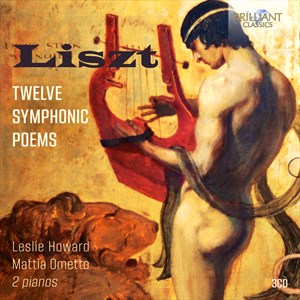Franz Liszt’s piano transcriptions of his symphonic poems are more than mere keyboard substitutes. He deploys the orchestral material between two pianos with clarity, sophistication, and idiomatic flair. Through Liszt’s canny keyboard registration, chains of string tremolos somehow never sound clattery or fatiguing. March motives gain emotional intensity through effective antiphonal back and forth between the instruments. Sweeping arpeggios in all directions represent loud orchestral tuttis, while Liszt largely avoids thick doublings in contrapuntal passages.
For all of their ingenuous pianistic resourcefulness, however, the arrangements don’t play themselves. They need pianists who are willing to give themselves over to Liszt’s heightened rhetoric and dynamic extremes, as well as being able to balance foreground and background material in proper perspective, without coming off “notey”. Then there’s the issue of divining tempo relationships that ensure dramatic unity while minimizing the music’s occasional rambling tendencies (especially in longer selections like Die Ideale and Ce qu’on entend sur la montagne). Not only do Leslie Howard and Mattia Ometto navigate Liszt’s technical challenges with fluency and ease, but they also treat the scores seriously, playing for effect only when necessary, achieving impressive unanimity and long-lined shape in extended passages featuring dotted rhythms that can easily bog down in the hands of less mindful duettists.
Good examples of what I mean can be found throughout Hungaria, or in the climaxes of Les Preludes or Mazeppa. Howard and Ometto also bring out the music’s harmonic tension through subtle accents and gradations of touch. Given the unevenness of the Mangos sisters’ Cedille cycle, and that the Hungarian Piano Duo’s excellent Hungaroton cycle is difficult to source, Howard and Ometto essentially have the field to themselves, abetted by close-up, full-bodied sonics. Howard’s excellent annotations and Brilliant Classics’ budget price further clinch my recommendation for collectors curious about these relatively neglected yet unquestionably worthwhile arrangements.
































